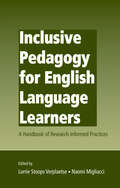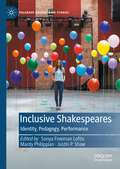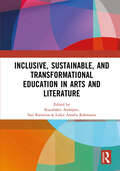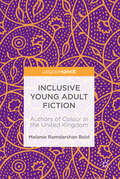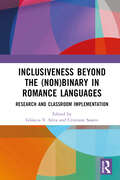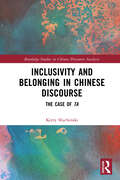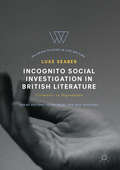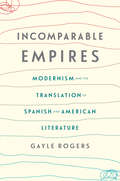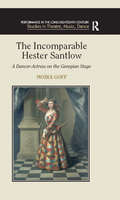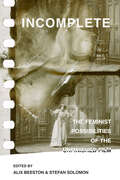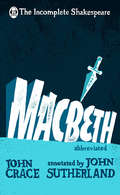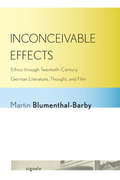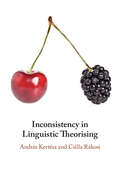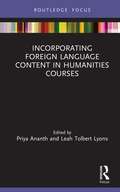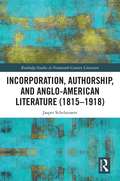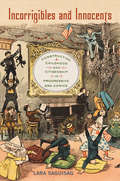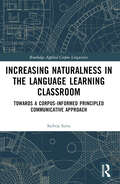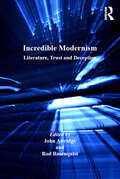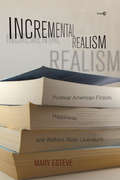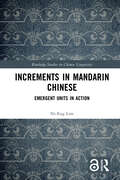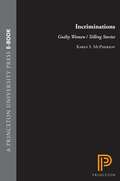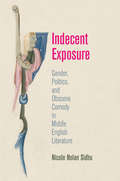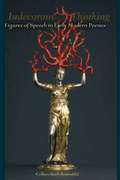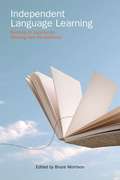- Table View
- List View
Inclusive Pedagogy for English Language Learners: A Handbook of Research-Informed Practices
by Lorrie Stoops Verplaetse Naomi MigliacciIn this Handbook leading researchers, teacher educators, and expert practitioners speak to current and future educators and educational leaders in understandable language about the research that informs best practices for English language learners integrated into the K-12 public school system. Responding to current state and federal mandates that require educators to link their practices to sound research results, it is designed to help educators to define, select, and defend realistic educational practices that include and serve well their English language learning student populations. A critical and distinctive feature of this volume is its non-technical language that is accessible to general educators who have not been trained in the fields of second-language development and applied linguistics. Each chapter begins with a thorough discussion of the recommended practices, followed by a description of the research that supports these practices. The rigor of reported research is contained, but this research is written in a lay person’s terminology, accompanied by bibliographies for readers who wish to read about the research in technical detail. The volume is structured around four themes: • In the Elementary Classroom• In the Middle and Secondary Classroom• School and Community Collaboration• School and District Reform. Inclusive Pedagogy for English Language Learners is intended for current and future educational administrators, all educators who have a keen interest in school reform at the classroom, school, or district level, and staff developers, policy makers, parents and community groups, and anyone interested in the successful education of linguistically and culturally diverse students.
Inclusive Shakespeares: Identity, Pedagogy, Performance (Palgrave Shakespeare Studies)
by Sonya Freeman Loftis Mardy Philippian Justin P. ShawInclusive Shakespeares: Identity, Pedagogy, Performance responds to the growing concern to make Shakespeare Studies inclusive of prospective students, teachers, performers, and audiences who have occupied a historically marginalized position in relation to Shakespeare's poetry and plays. This timely collection includes essays by leading and emerging scholarly voices concerned to open interest and participation in Shakespeare to wider appreciation and use. The essays discuss topics ranging from ethically-informed pedagogy to discussions of public partnerships, from accessible theater for people with disabilities to the use of Shakespeare in technical and community colleges. Inclusive Shakespeares contributes to national conversations about the role of literature in the larger project of inclusion, using Shakespeare Studies as the medium to critically examine interactions between personal identity and academia at large.
Inclusive, Sustainable, and Transformational Education in Arts and Literature: Proceedings of the 7th International Seminar on Language, Education, and Culture, (ISoLEC, 2023), July 07—08, 2023, Malang, Indonesia
by Sari Karmina Kusubakti Andajani Lidya Amalia RahmaniaThis book contains the proceedings of The International Seminar on Language, Education, and Culture (ISoLEC) 2023, an annual conference hosted by the Faculty of Letters, Universitas Negeri Malang. With the theme, Inclusive, Sustainable, and Transformational Education in Arts and Literature, ISoLEC aims to address key issues such as inclusive education in language, arts, and culture, sustainable education in language, arts, and culture, post-pandemic teaching and learning practices, corpus-based language, teaching and research, language in media, gender and identity, pop contemporary and digital culture, culture and spirituality, multilingualism and translanguaging, visual and performing arts, oral tradition and local culture, and digital literacy and information science. This book is a collection of selected articles that were presented at the conference covering issues of arts, language, and cultures. This conference addressed a range of relevant topics including:· Inclusive Education in Language, Arts, & Culture· Sustainable Education in Language, Arts, & Culture· Post Pandemic Teaching and Learning Practices· Corpus-Based Language, Teaching and Research· Language in Media· Gender and Identity· Pop, Contemporary and Digital Culture· Culture and Spirituality· Multilingualism and Translanguaging· Visual and Performing Arts· Oral Tradition & Local Culture· Digital Literacy and Information ScienceThis proceeding will be of interest to students, lecturers, teachers, and academics who are interested in developing their knowledge in the field of language, education, and culture. Specifically, this book will be an interesting read for those who want to reimagine the inclusive and sustainable education.
Inclusive Young Adult Fiction: Authors of Colour in the United Kingdom
by Melanie Ramdarshan BoldThis book examines ‘diversity’, or the lack thereof, in young adult fiction (YA) publishing. It focuses on cultural hegemony in the United Kingdom and explores how literary culture aimed at young adults reproduces and perpetuates ‘racial’ and ethnic cultural hierarchies. Diversity is described by the We Need Diverse Books project as ‘all diverse experiences, including (but not limited to) LGBTQIA, Native, people of color, gender diversity, people with disabilities, and ethnic, cultural, and religious minorities’. This study focuses on people of colour. While previous studies have looked at the representation of ethnic minorities in books for children and young adults, this book examines the experiences of ‘own voice’ cultural producers that create a counter-narrative. Specifically, this book will investigate the output and experiences of British young adult fiction authors of colour (BAME authors) published in the UK during the period 2006-2016, drawing upon semi-structured interviews with a sample of authors.
Inclusiveness Beyond the (Non)binary in Romance Languages: Research and Classroom Implementation
by Gláucia V. Silva Cristiane SoaresInclusiveness Beyond the (Non)binary in Romance Languages: Research and Classroom Implementation explores both research and best practices related to inclusive language so that all students, regardless of gender identity, may be active participants in their language learning communities.Given the binary nature of Romance language grammars, it is essential that scholarly inquiry into issues related to (non)binarism be further developed and become more visible, and this volume aims to embed the issue of linguistic inclusivity within broader conversations surrounding social justice to ensure that conversations do not stop with mere linguistic changes. The book is divided into two parts: the first focuses on research related to inclusive and nonbinary forms in Romance languages, while the second highlights teaching practices and encompasses inclusive approaches that go beyond the nonbinary. Although the volume focuses on Romance languages, most (if not all) of the content is applicable to other linguistic contexts. This volume also goes beyond issues of gender inclusivity and includes content that leads to a reflection on issues of equity and social justice more broadly.This edited volume is a resource for scholars whose research focuses on inclusive language and for educators who are interested in learning more about why and how to foster inclusiveness in their language classrooms and in their workplaces.
Inclusivity and Belonging in Chinese Discourse: The Case of ta (Routledge Studies in Chinese Discourse Analysis)
by Kerry SluchinskiInclusivity and Belonging in Chinese Discourse explores how recent language change in the third-person pronoun system of Mandarin Chinese is harnessed by netizens to construct spaces of (non-)belonging along a fluid continuum in the context of pro- and anti-LGBTQ discourses.Grounded in stance, framing, and positioning theories, the monograph contributes to the notions of membership categorization and (co-)reference chains for identity construction. With a focus on newly emergent genderless third-person pronoun ta, written in pinyin, and the various noun and verb phrases which co-occur with the pronoun in specific contexts, this monograph shows how ta has become a conventionalized language practice accepted and implemented by language users of various identities, sexual orientations, and backgrounds for a vast array of interactional and communicative purposes. The monograph illustrates how ta is used in doing identity construction work for the self, another party involved in the interaction, and/or a third party external to the interaction, often simultaneously. That is, the specific function and referent of ta is defined through language users’ unique interpretations and the discourse community of use, resulting in a ‘chameleon-like’ pragmatically loaded pronoun which reflects the inherent fluidity of identity(ies).This monograph will appeal to scholars, language researchers, and advanced graduate students concerned with inclusive language use in the Chinese context, particularly within discourse analysis, linguistics, sociolinguistics, and semantics. The book will also be valuable to professionals concerned with inclusive language and identity construction.
Incognito Social Investigation in British Literature
by Luke SeaberThis book is the first full critical history of incognito social investigation texts - in other words, works detailing their authors' experiences whilst pretending to be poor. The most famous example is Down and Out in Paris and London, but there has been a vast array of other works in the genre since it was created in 1866 by James Greenwood's 'A Night in a Workhouse'. It draws up a classification of incognito social investigation texts, dividing them into four subtypes. The first comprises those texts following most narrowly in James Greenwood's footsteps, taking the extreme poor as their object of study. The next is the investigation of poverty through walking, for pedestrianism and poverty are fascinatingly linked. The third is that of people looking at relative poverty rather than absolute, where authors take on badly-paid work in order to report on it, which is when incognito social investigation becomes very much something carried out by women. We end looking at those incognito social investigators who settled in the areas they explored. Not only will this book recover the history of a genre that has long been ignored, however, but it will also offer significant close reading of many of the texts that it places within the tradition(s) it discovers.
Incomparable Empires: Modernism and the Translation of Spanish and American Literature
by Gayle RogersThe Spanish-American War of 1898 seems to mark a turning point in both geopolitical and literary histories. The victorious American empire ascended and dominated the globe culturally in the twentieth century, while the once-mighty Spanish empire declined and became a minor state in the world republic of letters. But what if this narrative relies on several faulty assumptions, and what if key modernist figures in both America and Spain radically rewrote these histories-at the foundational moment of modern literary studies?Rogers follows the networks of American and Spanish writers, translators, and movements to uncover surprising arguments that forged the politics and aesthetics of modernism. He revisits the role of empire-from its institutions to its cognitive effects-in shaping a nation's literature and culture. He reads the provocative, often counterintuitive arguments of John Dos Passos, who held that "American literature" could only flourish if the expanding U.S. empire collapsed like Spain's. He follows Ezra Pound's use of Spanish poetry to structure the Cantos and the poet Juan Ramón Jiménez's interpretations of modernismo across several languages. And he tracks the controversial theorization of a Harlem-Havana-Madrid nexus for black writing, and Ernest Hemingway's development of a version of cubist Spanglish in For Whom the Bell Tolls.
Incomparable Empires: Modernism and the Translation of Spanish and American Literature (Modernist Latitudes)
by Gayle RogersThe Spanish-American War of 1898 seems to mark a turning point in both geopolitical and literary histories. The victorious American empire ascended and began its cultural domination of the globe in the twentieth century, while the once-mighty Spanish empire declined and became a minor state in the world republic of letters. But what if this narrative relies on several faulty assumptions, and what if key modernist figures in both America and Spain radically rewrote these histories at a foundational moment of modern literary studies?Following networks of American and Spanish writers, translators, and movements, Gayle Rogers uncovers the arguments that forged the politics and aesthetics of modernism. He revisits the role of empire—from its institutions to its cognitive effects—in shaping a nation's literature and culture. Ranging from universities to comparative practices, from Ezra Pound's failed ambitions as a Hispanist to Juan Ramón Jiménez's multilingual maps of modernismo, Rogers illuminates modernists' profound engagements with the formative dynamics of exceptionalist American and Spanish literary studies. He reads the provocative, often counterintuitive arguments of John Dos Passos, who held that "American literature" could only flourish if the expanding U.S. empire collapsed like Spain's did. And he also details both a controversial theorization of a Harlem–Havana–Madrid nexus for black modernist writing and Ernest Hemingway's unorthodox development of a version of cubist Spanglish in For Whom the Bell Tolls. Bringing together revisionary literary historiography and rich textual analyses, Rogers offers a striking account of why foreign literatures mattered so much to two dramatically changing countries at a pivotal moment in history.
The Incomparable Hester Santlow: A Dancer-Actress on the Georgian Stage (Performance in the Long Eighteenth Century: Studies in Theatre, Music, Dance)
by Moira GoffIn the first full-length study of the English dancer-actress Hester Santlow, Moira Goff focuses on her unusual career at Drury Lane between 1706 and 1733. Goff charts Santlow's repertoire and makes extensive use of archival resources to investigate both her dancing and acting skills. Santlow made a unique contribution to the development of dance on the London stage, through her dancing roles in dance dramas by John Weaver and pantomimes by John Thurmond and Roger, as well as the virtuoso dances created for her by Mr. Isaac and Anthony L'Abbé. Goff examines Santlow's fascinating personal life, including her relationships with the politician James Craggs the Younger and the Drury Lane actor-manager Barton Booth. Santlow was unusual in making the transition from successful dancer-actress to independent and respectable widow. Goff also traces her life after retirement as her daughter's family rose from the gentry towards the aristocracy. This book will be of interest to dance and theatre historians, to women's studies scholars, and to all who are engaged with ongoing debates on the lives and careers of women on the seventeenth- and eighteenth-century stage.
Incomplete: The Feminist Possibilities of the Unfinished Film (Feminist Media Histories #5)
by Alix Beeston and Stefan SolomonThis field-defining collection establishes unfinished film projects—abandoned, interrupted, lost, or open-ended—as rich and underappreciated resources for feminist film and media studies. In deeply researched and creatively conceived chapters, scholars join with film practitioners in approaching the unfinished film as an ideal site for revealing the lived experiences, practical conditions, and institutional realities of women's film production across historical periods and national borders. Incomplete recovers projects and practices marginalized in film industries and scholarship alike, while also showing how feminist filmmakers have cultivated incompletion as an aesthetic strategy. Objects of loss and of possibility, incomplete films raise profound historiographical and ethical questions about the always unfinished project of film history, film spectatorship, and film studies.
Incomplete Shakespeare: Macbeth
by John Crace John Sutherland‘Give me the daggers and I’ll pin the blame/ On Duncan’s grooms who both are also slain. /A little water clears us of this deed /Though a large scotch might also do the trick...’ To celebrate the 400th anniversary of Shakespeare's death, this is the first of a new collection of the Bard's greatest plays, digested to a few thousand words with invaluable side notes from John Sutherland. Funny and incredibly clever, these parodies are a joy for those who know their Shakespeare, perfect for the theatre goer needing a quick recap, and a massive relief for those just desperate to pass their English exam.This ebook has a large amount of footnotes and is best viewed on a device that supports pop-up text.
Inconceivable Effects
by Martin Blumenthal-BarbyIn Inconceivable Effects, Martin Blumenthal-Barby reads theoretical, literary and cinematic works that appear noteworthy for the ethical questions they raise. Via critical analysis of writers and filmmakers whose projects have changed our ways of viewing the modern world-including Hannah Arendt, Franz Kafka, Walter Benjamin, the directors of Germany in Autumn, and Heiner Mueller-these essays furnish a cultural base for contemporary discussions of totalitarian domination, lying and politics, the relation between law and body, the relation between law and justice, the question of violence, and our ways of conceptualizing "the human." A consideration of ethics is central to the book, but ethics in a general, philosophical sense is not the primary subject here; instead, Blumenthal-Barby suggests that whatever understanding of the ethical one has is always contingent upon a particular mode of presentation (Darstellung), on particular aesthetic qualities and features of media. Whatever there is to be said about ethics, it is always bound to certain forms of saying, certain ways of telling, certain modes of narration. That modes of presentation differ across genres and media goes without saying; that such differences are intimately linked with the question of the ethical emerges with heightened urgency in this book.
Inconsistency in Linguistic Theorising
by András Kertész Csilla RákosiIt is widely believed that inconsistency is one of the greatest sins a scholar can commit. This issue is especially relevant in linguistics due to the rich diversity of data types, exceptions to the rules, counterexamples to the hypotheses, and background assumptions which constantly come into conflict with methodological principles. Bringing together ideas from linguistics and philosophy of science, this groundbreaking book seeks to answer the following questions: which kinds of inconsistency arise in linguistic theorising? Under which conditions can inconsistencies be tolerated? And how can inconsistencies be resolved? It is the first study to develop a novel metatheoretical framework that accounts for the emergence and the resolution of inconsistency in linguistic theorising, and to reveal the strategies of inconsistency resolution in theoretical linguistics. Supported by detailed case studies, the findings of this metatheoretical analysis can be applied to improve the effectiveness of the working linguist's problem-solving activity.
Incorporating Foreign Language Content in Humanities Courses
by Priya Ananth Leah Tolbert LyonsIncorporating Foreign Language Content in Humanities Courses introduces innovative ways to integrate aspects of foreign language study into courses containing humanities concepts. The edited collection offers case studies from various universities and across multiple languages. It serves as a useful guide to all foreign language faculty with any language expertise (as well as others interested in promoting foreign languages) for the adaptation and development of their own curricula. Infusing foreign language content into English-taught humanities courses helps promote languages as practical and relevant to students. It will be of interest to language educators, including teachers, teachers-in-training, teacher educators, and administrators.
Incorporation, Authorship, and Anglo-American Literature (Routledge Studies in Nineteenth Century Literature)
by Jasper SchelstraeteIncorporation, Authorship, and Anglo-American Literature (1815–1918) is concerned with the new ways in which nineteenth-century authors came to imagine nationhood in response to the emergent global market. It investigates how authors negotiated a largely unregulated global economic space, both imaginatively—in their representations of it—and pragmatically, through author-publisher agreements to circumvent the lack of transnational copyright or through market-driven self-censorship for different audiences. Until now, scholarship has struggled to find a single dynamic from which to consider the Anglo-American transatlantic cultural field, and transnational fields more generally. This volume offers that single dynamic through an innovative and interdisciplinary approach that brings together the research areas of literary and transnational studies with economic history. It shows how the positional national identities constructed by nineteenth-century texts were informed by economic self-interest in the emergent global marketplace. Through a series of case studies the book analyses how contemporary economic innovations determined nineteenth-century concepts of national and cultural self-identification. Presented within four main body chapters, each considers two case studies of nineteenth-century authors that are in productive contrast, including pairings between Herman Melville and Washington Irving, E.D.E.N. Southworth and Anthony Trollope, Charles Dickens and Harriet Beecher Stowe, and finally Thomas Hardy and Joseph Conrad.
Incorrigibles and Innocents: Constructing Childhood and Citizenship in Progressive Era Comics
by Lara SaguisagHistories and criticism of comics note that comic strips published in the Progressive Era were dynamic spaces in which anxieties about race, ethnicity, class, and gender were expressed, perpetuated, and alleviated. The proliferation of comic strip children—white and nonwhite, middle-class and lower class, male and female—suggests that childhood was a subject that fascinated and preoccupied Americans at the turn of the century. Many of these strips, including R.F. Outcault’s Hogan’s Alley and Buster Brown, Rudolph Dirks’s The Katzenjammer Kids and Winsor McCay’s Little Nemo in Slumberland were headlined by child characters. Yet no major study has explored the significance of these verbal-visual representations of childhood. Incorrigibles and Innocents addresses this gap in scholarship, examining the ways childhood was depicted and theorized in late nineteenth- and early twentieth-century comic strips. Drawing from and building on histories and theories of childhood, comics, and Progressive Era conceptualizations of citizenship and nationhood, Lara Saguisag demonstrates that child characters in comic strips expressed and complicated contemporary notions of who had a right to claim membership in a modernizing, expanding nation.
Increasing Naturalness in the Language Learning Classroom: Towards a Corpus-Informed Principled Communicative Approach (ISSN)
by Szilvia SzitaThis volume links corpus research to classroom practice and critically assesses how the integration of a corpus-informed methodology affects pedagogical choices, teaching materials and classroom activities. Focusing on the language classroom, and drawing on examples from English, French, German and Hungarian, this book demonstrates that such methodology is applicable to languages with very different properties.Drawing on both larger, general and smaller, more specialised corpora, including both spoken and written data, this volume: presents the key features of natural language according to corpus linguistics, establishing principles and methods to observe and practice natural-sounding language use suggests the characteristics of a coherent, corpus-informed methodology and contrasts this with existing methodologies explores ways in which this methodology can enhance language learning and discusses the types of activities that are most effective explains how this methodology be integrated into teacher training Bridging the long-persisting gap between corpus-informed language teaching research and applied classroom reform, this book is key reading for researchers in applied linguistics and language pedagogy, as well as teacher trainers and practitioners.
Incredible Modernism: Literature, Trust and Deception
by John AttridgeWith the twentieth century came a new awareness of just how much an individual was obliged to accept on trust, and this heightened awareness of social trust in turn prompted new kinds of anxiety about fraudulence and deception. Beginning with the premise that the traditional liberal concept of trust as a ’bond of society’ entered a period of crisis around the turn of the twentieth century, this collection examines the profound influence of this shift on a wide range of modernist writers, including James Joyce, Marcel Proust, Gertrude Stein, Ezra Pound, Wyndham Lewis, H.D., Ford Madox Ford, Samuel Beckett, Ralph Ellison and Wallace Stevens. In examining the importance of trust and fraudulence during the period, the contributors take up a diverse set of topics related to reception, the institutions of modernism, the history of authorship, the nature of representation, authenticity, genre, social order and politics. Taken as a whole, Incredible Modernism provides concrete historical coordinates for the study of twentieth-century trust, while also arguing that a problem of trust is central to the institutions and formal innovations of modernism itself.
Incremental Realism: Postwar American Fiction, Happiness, and Welfare-State Liberalism (Post*45)
by Mary EsteveThe postwar US political imagination coalesced around a quintessential midcentury American trope: happiness. In Incremental Realism, Mary Esteve offers a bold, revisionist literary and cultural history of efforts undertaken by literary realists, public intellectuals, and policy activists to advance the value of public institutions and the claims of socioeconomic justice. Esteve specifically focuses on era-defining authors of realist fiction, including Philip Roth, Gwendolyn Brooks, Patricia Highsmith, Paula Fox, Peter Taylor, and Mary McCarthy, who mobilized the trope of happiness to reinforce the crucial value of public institutions, such as the public library, and the importance of pursuing socioeconomic justice, as envisioned by the United Nations Universal Declaration of Human Rights and welfare-state liberals. In addition to embracing specific symbols of happiness, these writers also developed narrative modes—what Esteve calls "incremental realism"—that made justifiable the claims of disadvantaged Americans on the nation-state and promoted a small-canvas aesthetics of moderation. With this powerful demonstration of the way postwar literary fiction linked the era's familiar trope of happiness to political arguments about socioeconomic fairness and individual flourishing, Esteve enlarges our sense of the postwar liberal imagination and its attentiveness to better, possible worlds.
Increments in Mandarin Chinese: Emergent Units in Action (Routledge Studies in Chinese Linguistics)
by Ni-Eng LimLooking at everyday Mandarin Chinese conversations, this book provides a comprehensive examination of the practices used in producing Chinese increments.Increments have been identified as a key nexus that evinces how human interactional practices are fundamental to the structuration of grammar. Lim examines the common interactional work these increments do in their sequential context and what implications these findings have for our understanding of language and grammar. Based on the examination of actual interactional practices by Chinese speakers, findings show that all types of grammatically fitted and unfitted increments can be produced in a situated context. The research in this book also demonstrates how similar action can be pursued using different types of increments and that more than one “task” or action may be concurrently and subtly accomplished with the use of a single increment. The results indicate how the regular everyday practices of Chinese increment, formulated in moment-to-moment interaction, instantiate and endorse multiple principles expounded in emergent grammar, thereby adding to our wider understanding of language and grammar.This book will primarily interest researchers, graduate students, and educators working within the field of interactional linguistics and conversation analysis, in particular those in Chinese-speaking regions. As research on non-English data is still very limited in these areas, the book will also be useful for researchers with broad interests in the Chinese language.
Incriminations: Guilty Women/Telling Stories
by Karen S. McPhersonMaintaining that women's storytelling is a telling activity, Karen McPherson "reads for guilt" in novels by five twentieth-century writers--Simone de Beauvoir (L'Invitée), Marguerite Duras (Le ravissement de Lol V. Stein), Anne Hébert (Kamouraska), Virginia Woolf (Mrs. Dalloway), and Nicole Brossard (Le désert mauve). She finds in the vocabulary and atmosphere of these novels a linking of female protagonists to crime and culpability. The guilt, however, is not clearly imputed or assumed; it tends to trouble the conscience of the entire narrative. Through critical close readings and an inquiry into the interrelations among narration, transgression, and gender, McPherson explores how the women in the stories come under suspicion and how they attempt to reverse or rewrite the guilty sentence.The author examines the complex process and language of incrimination, reflecting on its literary, philosophical, social, and political manifestations in the texts and contexts of the five novels. She looks for signs of possible subversion of the incriminating process within the texts: Can female protagonists (and women writers) escape the vicious circling of the story that would incriminate them? In the course of this book, the stories are made to reveal their strikingly modern and postmodern preoccupations with survival.
Indecent Exposure: Gender, Politics, and Obscene Comedy in Middle English Literature (The Middle Ages Series)
by Nicole Nolan SidhuMen and women struggling for control of marriage and sexuality; narratives that focus on trickery, theft, and adultery; descriptions of sexual activities and body parts, the mention of which is prohibited in polite society: such are the elements that constitute what Nicole Nolan Sidhu calls a medieval discourse of obscene comedy, in which a particular way of thinking about men, women, and household organization crosses genres, forms, and languages. Inviting its audiences to laugh at violations of what is good, decent, and seemly, obscene comedy manifests a semiotic instability that at once supports established hierarchies and delights in overturning them.In Indecent Exposure, Sidhu explores the varied functions of obscene comedy in the literary and visual culture of fourteenth- and fifteenth-century England. In chapters that examine Chaucer's Reeve's Tale and Legend of Good Women; Langland's Piers Plowman; Lydgate's Mumming at Hertford, Troy Book, and Fall of Princes; the Book of Margery Kempe, the Wakefield "Second Shepherds' Play"; the Towneley "Noah"; and other works of drama, Sidhu proposes that Middle English writers use obscene comedy in predictable and unpredictable contexts to grapple with the disturbances that English society experienced in the century and a half following the Black Death. For Sidhu, obscene comedy emerges as a discourse through which writers could address not only issues of gender, sexuality, and marriage but also concerns as varied as the conflicts between Christian doctrine and lived experience, the exercise of free will, the social consequences of violence, and the nature of good government.
Indecorous Thinking: Figures of Speech in Early Modern Poetics
by Colleen Ruth RosenfeldIndecorous Thinking is a study of artifice at its most conspicuous: it argues that early modern writers turned to figures of speech like simile, antithesis, and periphrasis as the instruments of a particular kind of thinking unique to the emergent field of vernacular poesie. The classical ideal of decorum described the absence of visible art as a precondition for rhetoric, civics, and beauty: speaking well meant speaking as if off-the-cuff. Against this ideal, Rosenfeld argues that one of early modern literature's richest contributions to poetics is the idea that indecorous art—artifice that rings out with the bells and whistles of ornamentation—celebrates the craft of poetry even as it expands poetry’s range of activities. Rosenfeld details a lost legacy of humanism that contributes to contemporary debates over literary studies’ singular but deeply ambivalent commitment to form. Form, she argues, must be reexamined through the legacy of figure. Reading poetry by Philip Sidney, Edmund Spenser, and Mary Wroth alongside pedagogical debates of the period and the emergence of empiricism, with its signature commitment to the plain style, Rosenfeld offers a robust account of the triumphs and embarrassments that attended the conspicuous display of artifice. Drawing widely across the arts of rhetoric, dialectic, and poetics, Indecorous Thinking offers a defense of the epistemological value of form: not as a sign of the aesthetic but as the source of a particular kind of knowledge we might call poetic.
Independent Language Learning
by Bruce MorrisonIndependent learning is not a new concept for language educators but while teachers, curriculum designers and policy makers have embraced it as underpinning modern notions of education, it remains a dynamic and vibrant field for researchers and academics who aim to broaden its scope and deepen our understanding of how it may be applied most effectively both inside and outside the classroom. The book's authors use their experience of applying the concepts related to independent learning in various geographical, cultural and pedagogical tertiary level learning contexts to present new perspectives on how independent learning can inform and support policy, teaching methodology, curriculum development and the nurturing of successful learners. While the first section of the book provides a view of the field from three broad curriculum development viewpoints, the remaining chapters primarily focus on the experience of learners, teachers and curriculum developers in applying principles of learner autonomy, self-regulation and self-direction with various types of learner - each with their own identities, motivations, expectations and goals. These learner and teacher stories provide insights that are important for an understanding of some of the impacts an independent learning approach to language learning have on learners in various educational contexts. This book will be of value to pre-service and in-service teachers, curriculum developers and teacher educators working in diverse educational contexts in more fully appreciating the contribution an independent learning focus can make to successful learning.
